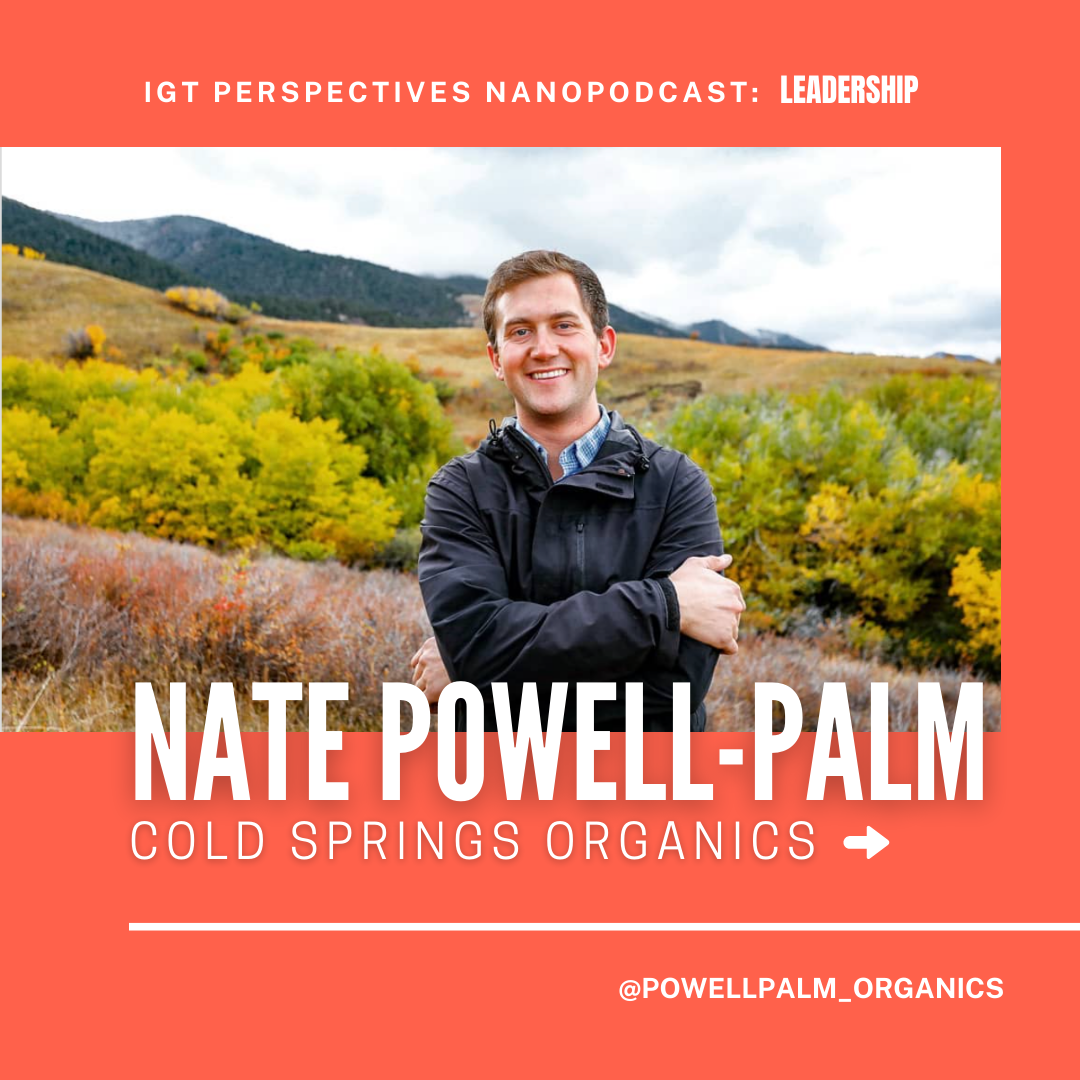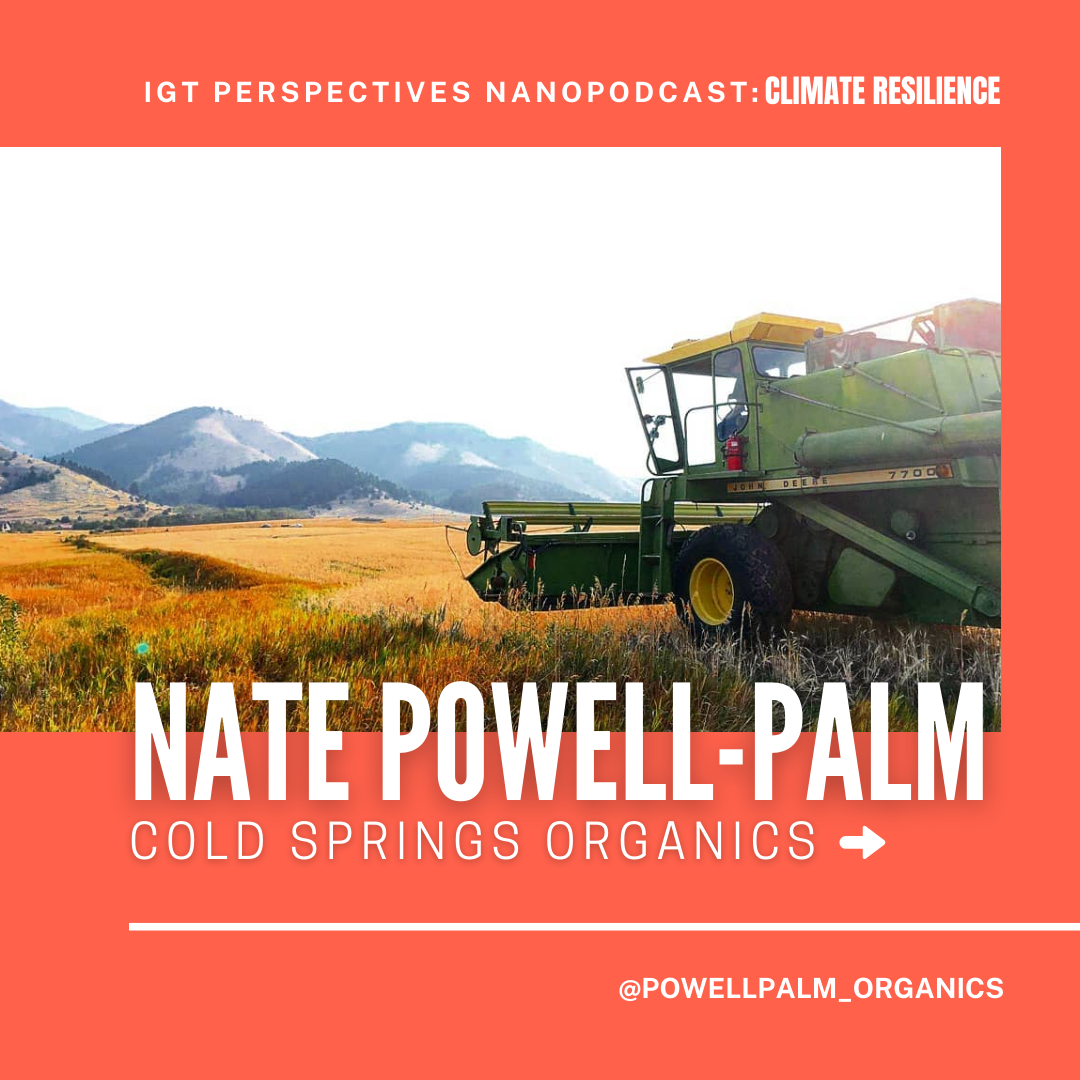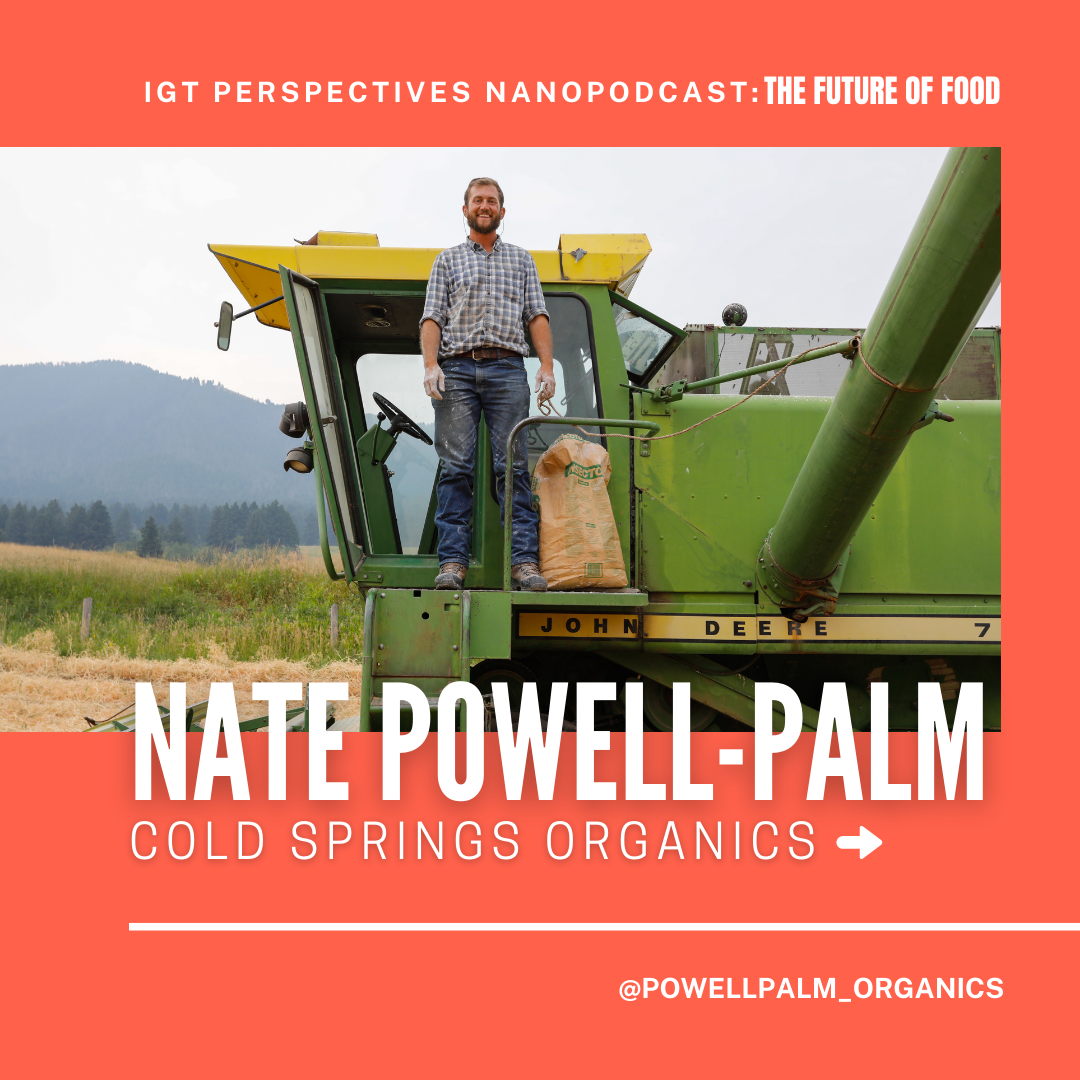The world is full of changemakers. And you might be one too.
Meet Nate Powell-Palm, the owner of Cold Springs Organics in Belgrade, Montana where he raises organic beef, grains, pulses and flax seed.
Along with running his diversified operation, Nate is also a member of the Montana Organic Association, serves on the National Organics Standards Board, and the governing board of the Organic Farmer’s Association, and works as an organic inspector. Nate is passionate about building a food system that supports everyone (and microorganism) along the supply chain, from farm to fork.
Listen in as Nate shares his perspective on leadership, business resilience in a rapidly changing climate, and the future of food.
Subscribe to Perspectives on Apple Podcasts or Spotify for more inspo from food leaders.

Alyssa Martinez Neumann (00:03):
The world is filled with changemakers, and you might be one too.
Maura Paxton (00:06):
Welcome to the nanopodcast, where we serve up bite-sized pieces of inspo from food leaders. We’re your hosts, Maura Paxton.
Alyssa Martinez Neumann (00:14):
And Alyssa Martinez Neumann. You’re listening to Perspectives.
Today, we talk with Nate Powell-Palm.
Nate Powell-Palm (00:34):
My name is Nate Powell-Palm, and I’m the owner of Cold Springs Organics, which is based out of Belgrade, Montana. I also am a member of Montana Organic Association and serve on the National Organic Standards Board.
Alyssa Martinez Neuman (00:50):
As usual, our guest shared their expertise in a snackable five minutes or less. Nate talks about how innovation, hard work, and remembering the why is fundamental to his leadership philosophy.
Nate Powell-Palm (01:01):
It’s an interesting question because I don’t necessarily see myself as a leader, even though I might write the checks. But I really like to see myself as just someone who is so passionate about the work that I want to work as hard as I possibly can and probably be the hardest worker on my team, and if I’m not the hardest worker on my team, I feel like I’m slacking. So, I really like to be doing work that I myself am passionate about and can celebrate in a way that I can help other people who are working with me, who are contracting with me to light a spark, and also be passionate about that work. I want to celebrate people where they’re at, and that has been, I think, a really effective way to build relationships in agriculture and in the organic community.
So, if I have someone, either an employee or a contractor, who doesn’t necessarily agree with organics or doesn’t really necessarily understand it, I really want to highlight everything that is so incredible about the work we get to do as organic farmers and dive into, why are we doing this work? What does this mean in a larger context? I think contextualizing farm work is something that we often miss because the work is really hard. It’s really hard. Lots of times, it’s very tedious. It’s repetitive, depending on what you’re doing, and you can lose sight of that as someone working on the farm.
If you don’t remember that we are addressing so many of the world’s ills when we’re doing this work. We’re bringing the absolute best nutrition possible to our fellow community, to people who otherwise aren’t able to access that food. So, I like to think that as a leader, I am able to hold onto that big picture pretty consistently and really dream with the people I work with every day about where is this business going, why are we doing this work, why is this work so incredible, and how do we blow this work up? How do we get kind of scale, not necessarily just as a business, but as a movement? Where does our work ultimately lead?
And what kind of legacy are we building when we till the field with minimum tillage to really hold as much organic matter down as possible or when we innovate a way to control Canadian thistles? That means that we can pass that knowledge onto someone who will then be able to leave herbicides behind. I think being able to constantly remember why we’re doing this work is something that I found helps me build a team that is really excited about the work we get to do and ultimately showing up with a lot of passion every day.
I’ve always had a little bit of a it’s okay to be different value system coming from my family. But I think if you’re not changing and improving something, you should find a different gig. So, I think if you’re not challenged, and you don’t see yourself contributing… I mean, we get 80 years to leave a really indelible mark, I hope, and if you’re just going along with something that’s already been figured out, even if it’s just conventional farming, why wouldn’t you want to innovate some way to make it so that we all live better, healthier, happier lives.
So, being an outsider has really never bothered me all that much. I see it as this really kind of exciting time where all of the restrictions that come with the markers of success in conventional farming just don’t have to apply to me. It shakes out in different ways. There’s no one way it’s going to shake out for every farmer. I think that’s super exciting, and it celebrates our strengths and our diversity.
Alyssa Martinez Neuman (04:54):
Just to recap, remember these key takeaways from Nate’s thoughts on leadership, show up with a lot of passion and always hold on to the bigger picture.
Don’t forget to check out the rest of Nate’s episodes and subscribe. Be sure to also follow us on Instagram at Oregon Tilth for even more inspo from food leaders.

Alyssa Martinez Neumann (00:03):
The world is filled with changemakers, and you might be one too.
Maura Paxton (00:06):
Welcome to the nanopodcast, where we serve up bite-sized pieces of inspo from food leaders. We’re your hosts, Maura Paxton.
Alyssa Martinez Neumann (00:14):
And Alyssa Martinez Neumann. You’re listening to Perspectives.
Today we talk with Nate Powell-Palm.
Nate Powell-Palm (00:35):
My name is Nate Powell-Palm, and I’m the owner of Cold Springs Organics, which is based out of Belgrade, Montana. I also am a member of Montana Organic Association and serve on the National Organic Standards Board.
Alyssa Martinez Neumann (00:50):
As usual, our guest shared their expertise in a snackable five minutes or less. Nate talks about how he builds climate resilience into his business models.
Nate Powell-Palm (01:01):
I sort of approach this from two ways. Climate change is here, climate change is happening, and we have to put our best effort forward to mitigate it and fight it as best we can. I think it also means that in farming, climate change means a world with a lot more risk, for farmers, for everybody. Really figuring out how to mitigate that risk is something I think about all the time
.
I’ve been of the philosoph,y and I’m not exactly sure where I got this philosophy, but I’ve just been someone who never wanted to farm with debt. I wanted to always be of the other size that I could farm the year through and not carry any debt year to year. The elimination of debt is something that I see as an absolutely critical component to farming in a world where climate is irregular and changing.
Building the business to expect lower yields is something I’ve also been doing. I think in organics, we’re somewhat comfortable with lower yields. We’re not super worried about absolutely maximizing the yield per acre because we’re realizing typically higher prices on our given crops and there’s some added value on the whole.
I think building my business model so that I expect lower yields across the board and figuring out how to make that business model work, I think will ultimately put me in a better position, if for some reason I don’t realize those lower yields, but also not leave me in a really tight spot if we do see the yield changes that most of the models predict.
I also like to have two backup plans for my crops. I’m going to have a contracted crop and sometimes I am going to over plant the acreage to make sure I meet that contract, but I might have a backup contract with someone who says, “If you have any extra, I’ll take it.” That way I know I have a home for it, but I also know that I am going to take care of my customers as best I can.
Livestock, I think are going to be such an integral part of a healthy farm ecosystem. They should have always been, we should’ve never allowed the divorce of livestock from crop production to happen. Now that the marriage is back kind of on the minds of a lot of producers, bringing livestock and integrating livestock back in means that you have a place for your crop to go if for some reason it fails for the actual intended purpose, which would be to harvest a dry animal crop in the form of grain. If I can graze a crop and realize some grazing potential, that just means I ultimately can still realize revenue, I’m going to be able to maintain a crop rotation, and I might even get the chance to better it via grazing because grazing is so important for the soil.
I could also, as a sort of my plan C in this changing climate world, think of all of the crops I grow potentially as cover crops. It’s never a bad thing to feed my soil and so if for some reason I hit a really tough drought at the wrong time in the plant’s growth cycle and I need to turn that in, I am ultimately feeding the microbes that’ll be there and more robust and able to cycle that biomass into organic matter in the long term.
Lastly, I think that there’s going to be a lot of benefits to thinking of how do we add the absolute maximum amount of value to our crops as much as possible. You have the baseline if your organic, but if you have a really long supply chain that you’re selling into, and you’re sort of selling to a really large commodity broker, you’re probably not going to realize a whole lot of that added value.
The more we can do to sell as close to home as possible, but also in a form that makes it so that you’re as close to the customer as possible. We’re going to be able to get more dollars per acre, thus keeping our businesses alive, but also fundamentally reduce the carbon footprint of our food and make sure that we’re taking care of our own communities.
Alyssa Martinez Neumann(05:18):
Just to recap, remember these key takeaways from Nate’s thoughts on climate resilience, reduce risk, and always have a backup plan.
Don’t forget to check out the rest of Nate’s episodes and subscribe. Be sure to also follow us on Instagram at Oregon Tilth for even more inspo from food leaders.

Alyssa Martinez Neumann (00:03):
The world is filled with changemakers, and you might be one too.
Maura Paxton (00:06):
Welcome to the nanopodcast, where we serve up bite-sized pieces of inspo from food leaders. We’re your hosts, Maura Paxton.
Alyssa Martinez Neumann (00:14):
And Alyssa Martinez Neumann. You’re listening to Perspectives.
Today we talk with Nate Powell-Palm.
Nate Powell-Palm (00:34):
My name is Nate Powell-Palm, and I’m the owner of Cold Springs Organics, which is based out of Belgrade, Montana. I also am a member of Montana Organic Association and serve on the National Organic Standards board.
Alyssa Martinez Neumann (00:50):
As usual, our guest shared their expertise in a snackable five minutes or less. Nate talks about his vision for the future of food.
Nate Powell-Palm (00:57):
I live in a space in my head where it is all so excited that I think right now there’s a lot of low-hanging fruit. And I think for a farmer, I would love to see a world where we don’t have to farm with debt. Where we have enough cash in the bank from our crops and we farm in such a way that our risk is low enough, where we can feel like we can always sleep pretty easy at night. Harvest is always going to be tough, but on the whole if you can sleep easy at night knowing that we have enough labor to get all the work done. That we’ve taken care of ourselves emotionally, we have good mental health and we farm in a community where we can prop each other up. And we realized that at least for me, I like to clarify my goals, that I want to raise a lot of really good food for my community, but really the idea of I want to raise food for people. I want to feed people.
And that future I think is really bright when we think of how many people are malnourished. They don’t have a lot of food. They don’t have the right food. And what an amazing opportunity, when we think about that we get the chance as farmers to provide food to so many people. Because I do a lot of organic farm inspections, I get to hear a lot of stories. So I have my own experiences as an organic farmer, but I also get to hear a lot of stories about organic farmers who in different parts of the country are in a food glut. They’re in a commodity glut. So there’s either too much organic milk on the market. There’s too many organic eggs on the market. There’s too much organic corn, or soybeans. And, I hear that and I think about it.
And then I hear on the news and realize in my community that there are unprecedented lines at the community food banks. There is a lot of food insecurity. And so I am most excited by the fact that, okay, we have too much food on the farm side and we have a real need for food on the consumer side. And what is it about our distribution system that is so inefficient that it can’t marry those two up. And so in 10 years I see — by work that I see a lot of people doing already – but that I hope to contribute to as well, the real unkinking and freeing of the pipeline of farm to plate. I want to see all of these eggs go into communities that are under-resourced and underserved rather than just Whole Foods. I think Whole Foods is a wonderful place, but I want to see organics and good, healthy, nutritious food in general, showing up in all communities across America.
And I think in a real way that’s going to be possible when farmers realize that they’ve got a pretty cool role to play. They control a lot of calories. I mean, when you harvest a field of wheat you can feed hundreds of people for a while off of that field of wheat. And instead of looking at it as, “Oh, I’m only getting seven bucks a bushel.” Thinking of it as, “Oh, I could make 42 loaves of bread from every single one of these bushels of wheat. And I make 40 bushels every acre. That’s a lot of bushels that I could be providing either to my community or to another community.”
And so figuring out how to get that pipeline from farm to fork a lot more cleared and streamlined and pumping along, I would envision a real opportunity to see food insecurity rapidly decline by the realization that we have a lot of food and we just need to disseminate it better. So I see a world where we don’t have malnourishment and where every farm is thriving on a scale where we don’t have to risk everything just to stay in business. And also that we get the chance to self-actualize. That we get the chance to be the multifaceted people that we are. I think that’s really possible and I think it’s just going to take a little bit of elbow grease and understanding what our goals are collectively.
Alyssa Martinez Neumann (05:23):
Just to recap, remember these key takeaways from Nate’s thoughts on the future of food. Own your role as a farmer to help your community thrive.
Don’t forget to check out the rest of Nate’s episodes and subscribe. Be sure to also follow us on Instagram at Oregon Tilth for even more inspo from food leaders.



















